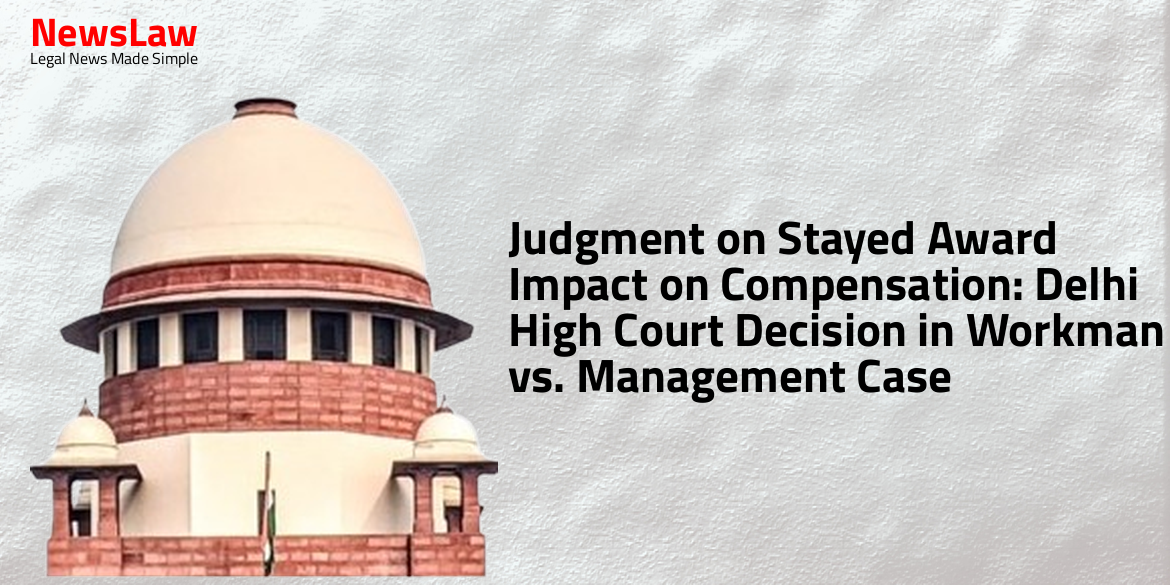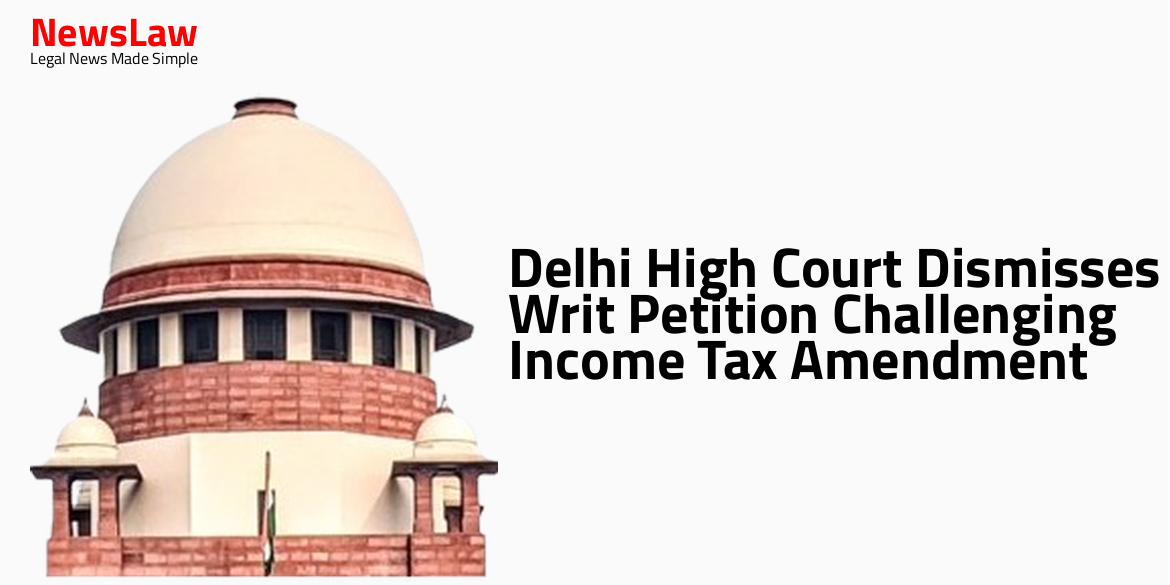In a recent verdict, the Delhi High Court addressed the implications of a stayed award on compensation in the case involving the Workman and the Management. The Court’s decision sheds light on the complex legal aspects surrounding designations, salaries, and retrenchment compensations. Stay tuned to understand the nuanced legal arguments presented and the ultimate ruling that could shape future labor disputes in the industry.
Facts
- The workman failed to raise objections regarding his designation and salary while working with the management
- The Industrial Tribunal’s judgment did not grant the workman the ‘skilled’ designation as per the scheduled employment for the plastic, rubber, and PVC industry
- The workman consistently received payment as per the salary prescribed for an ‘unskilled’ worker without raising any concerns
- The stay on the implementation of the award by the Industrial Tribunal should have been considered, as per the Petitioner Management’s request
- The workman did not demonstrate urgency in seeking a stay on the award, as indicated by the pending Stay Application
- The learned Labour Court decided in favor of the respondent workman against the petitioner entity.
- The respondent workman was awarded a lump-sum compensation of Rs.200,000/- to be paid within one month by the petitioner management.
- If not paid within one month, the management would be liable to pay interest at 9% per annum.
- The Labour Court considered the workman entitled to wages of skilled and semi-skilled category.
- The management had not paid the wages of skilled and semi-skilled workers as ordered by POIT.
- The back wages issue from the date of the award until a specific date would be decided by the High Court.
- The designation case decided by POIT on 29.09.2009 granted designations of skilled and semi-skilled workers to all 22 workers.
- The management calculated retrenchment compensation based on the last drawn salary of the claimant instead of the wages of skilled and semi-skilled workers ordered by POIT.
- The period from the date of transfer till the date of rejoining should not have been included in the total period of working while calculating retrenchment compensation.
- Sections 9A and 25-N of the Act were deemed to have no application in this case.
Issue
- The issue at hand is whether the stayed award of the Industrial Tribunal could be relied upon by the Labour Court to determine the entitlement to compensation.
- The Workman in question had been receiving the salary of an ‘unskilled’ laborer from the date of appointment till the time of retrenchment.
- The Labour Court must decide on the reliance and relevance of the Industrial Tribunal’s stayed award in the current case.
- The matter under consideration is whether the termination of services and subsequent retrenchment were in violation of Section 25F of the Act.
- The court needs to determine if the impugned award by the Labour Court should be interfered with under Article 226 of the Constitution of India.
Arguments
- The petitioner argues that the impugned award was passed without considering all the facts and circumstances of the case.
- The petitioner claims that the workman has been in their service for 16 years and is now at an age where finding another job is challenging.
- The petitioner highlights that the compensation in the award was based on the designation given to the workman in a previous award from 2009.
- The petitioner asserts that the material and documentary evidence considered by the Labour Court in passing the 2017 awards cannot be re-evaluated in a writ jurisdiction unless there is shown illegality or perversity in those awards.
- The petitioner points out that the workman had been accepting unskilled laborer salary without objection during his entire tenure.
- Granting designation to the claimant has been stayed by correctly calculating retrenchment compensation and notice pay as per their last drawn wages, not as per the award dated 29.09.2009 which the claimant did not challenge before any forum.
- The award dated 29.09.2009 has become final and is operating as res-judicata.
Analysis
- The claimant failed to prove that he had not become surplus at the time of retrenchment and that he had sufficient work.
- The designation case decided in favor of the workers granted them the designations sought by them, and this decision was stayed by the High Court.
- The management proved that the claimant had become surplus based on the seniority list and attendance register.
- The court decided in favor of the claimant and against the management regarding the services being terminated in violation of Section 25F of the Act.
- The designation awarded by the POIT in 2009 was considered in determining compensation despite being stayed in 2013.
- The claimant was retrenched illegally without being compensated according to the skilled designation awarded by the Industrial Tribunal in 2009.
- The management failed to calculate the notice pay and compensation based on the 2009 award, violating Section 25-F of the Act.
- The claimant was entitled to retrenchment compensation as a skilled/semi-skilled worker, not as an unskilled laborer when retrenched in 2010.
- The court found that there was no error in the impugned award, given the limited scope under Article 226 of the Constitution of India.
- The seniority list was properly displayed and sent to the Labor Commissioner, proving the management adhered to the rules.
- The Supreme Court, in the case of Shree Chamundi Mopeds Ltd. v. Church of South India Trust Assn., discussed the effect of a stay on judicial adjudication.
- The Court clarified that imposition of a stay does not nullify the operation of the law or the benefits provided by it, such as enhanced rates or late payment surcharge.
- The Court emphasized the importance of restitution in placing parties in the same position as they would have been without the stay, upon the dismissal of the petition or proceedings.
- The legal maxim ‘actus curiae neminem gravabit’ (an act of the Court shall prejudice no man) is applicable in such cases, ensuring fairness in resolving disputes.
- The Court cited various cases where the need for restitution and payment of interest on withheld amounts after the dismissal of the petition was upheld.
- The distinction between a repeal and suspension of the law was explained, highlighting that repeal removes the law entirely while suspension allows the law to remain operational in other aspects.
- The judgment emphasized the duty of the court to restore parties to their pre-stay positions and ensure fairness in enforcing legal obligations, especially in cases of closure of management due to financial difficulties.
- Section 25-F of the Act outlines conditions for retrenchment of a workman.
- Employer must give one month’s written notice or pay wages in lieu of notice.
- Employer must pay compensation equivalent to fifteen days average pay for every completed year of service during retrenchment.
- Notice to the appropriate government is required for a valid claim for compensation.
- Workman must have been in continuous service for at least one year with the employer.
- Learned Labour Court found the retrenchment of workmen by the petitioner management to be illegal
- Workmen were not compensated as per their designated positions
- Petitioner management failed to present any arguments in their favor
- No merit found in the petitions by the Court
- The findings of the Labour Court were deemed legal and valid
Decision
- The petitioner management is directed to pay the compensation awarded by the Labour Court to the respective workmen within three months.
- The batch of petitions is dismissed.
- The management must pay Rs.2,00,000/- to the workman within one month of the award publication, with 9% interest per annum for delays.
- Parties will bear their own costs.
- Copies of the award will be sent to the Govt. of NCT of Delhi for publication.
- The file will be moved to the record room.
- The issue of whether the retrenchment of the workman was illegal and unjustified was adjudicated by the Labour Court.
- The award given by the Labour Court is upheld.
- Pending applications are also dismissed.
- The judgment will be uploaded on the website immediately.
Case Title: SAWHNEY RUBBER INDUSTRIES Vs. SH. RAMAYAN YADAV (2024:DHC:4569)
Case Number: W.P.(C)-6068/2020



